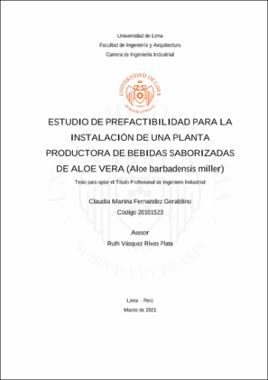| dc.contributor.advisor | Vásquez Rivas Plata, Ruth | |
| dc.contributor.author | Fernandez Geraldino, Claudia Marina | |
| dc.date.accessioned | 2021-05-26T21:21:12Z | |
| dc.date.available | 2021-05-26T21:21:12Z | |
| dc.date.issued | 2021 | |
| dc.identifier.citation | Fernandez Geraldino, C. M. (2021). Estudio de prefactibilidad para la instalación de una planta productora de bebidas saborizadas de aloe vera (Aloe barbadensis miller) [Tesis para optar el Título Profesional de Ingeniero Industrial, Universidad de Lima]. Repositorio institucional de la Universidad de Lima. https://hdl.handle.net/20.500.12724/13174 | es_PE |
| dc.identifier.uri | https://hdl.handle.net/20.500.12724/13174 | |
| dc.description.abstract | La siguiente tesis muestra el estudio de prefactibilidad de una planta productora de bebidas saborizadas de aloe vera en el Perú. Durante el desarrollo de investigación se analizó la viabilidad técnica, de mercado, económica, financiera, social y ambiental con la finalidad de confirmar la hipótesis planteada.
Se realizó un estudio de mercado para comprobar que el producto será bien aceptado por los consumidores. Con los resultados, se obtuvo que un 89% de las personas encuestadas estarían dispuestas a consumir la bebida y un 86%, tendría una intención de compra.
Se segmentó el mercado a las personas que se encuentran dentro de la ciudad de Lima Metropolitana, que pertenezcan a los NSE A y B y que tengan 15 años o más con un estilo de vida sofisticado.
Asimismo, se calculó que la demanda del proyecto alcanzaría 1,516,710 botellas vendidas para el primer año y 1,988,337 botellas para el quinto año.
Se realizó un ranking de factores de micro y macro localización, para encontrar la mejor ubicación de la planta. Como resultado, se encontró que el lugar óptimo sería Lurín.
Se analizaron los factores limitantes para determinar el tamaño de planta. Así se obtuvo que el punto de equilibrio serían 663,578 botellas al año y el tamaño de planta, 1,988,337 botellas al año.
Finalmente, se determinó la viabilidad económica, financiera y social del estudio de prefactibilidad.
En la evaluación económica se obtuvo un VAN de S/ 2,066,073 y un TIR de 53%. Por otro lado, en la evaluación financiera se obtuvo un VAN de S/ 2,191,116 y un TIR de 87%.
El valor agregado del proyecto resultó en S/ 12,028,071. | es_PE |
| dc.description.abstract | The following thesis shows the pre-feasibility study of a factory that produces aloe vera drinks in Peru. During the research development, the technical, economic and financial feasibility was analyzed in order to confirm the hypothesis.
Market studies were conducted to verify that the product will be accepted by consumers. Survey’s results show that 89% of the people surveyed will consume the drink and 86% would have an intention to buy.
The market was segmented to people who live in Metropolitan Lima. People with high socioeconomic status between A and B and who are 15 years old and with a sophisticated lifestyle.
The demand for the project was estimated in 1,516,710 bottles sold for the first year and 1,988,337 bottles sold for the fifth year.
A ranking of factors was necessary to find the best location of the company. As a result, like the optimal place to build the company is Lurin.
I analyzed the limiting factors in order to define the optimal factory size. It was obtained that the market size are 1,988,337 bottles per year.
Finally, the economic, financial and social viability of the pre-feasibility study was determined.
In the economic evaluation, it obtained an NPV of S/ 2,066,073 and an IRR of 53%. On the other hand, in the financial evaluation, it obtained an NPV of S/ 2,191,116 of IRR of 87%.
The added value of the project would be S/ 12,028,071. | en_EN |
| dc.format | application/pdf | |
| dc.language.iso | spa | |
| dc.publisher | Universidad de Lima | |
| dc.rights | info:eu-repo/semantics/openAccess | * |
| dc.rights.uri | https://creativecommons.org/licenses/by-nc-sa/4.0/ | * |
| dc.source | Repositorio Institucional - Ulima | |
| dc.source | Universidad de Lima | |
| dc.subject | Bebidas sin alcohol | es_PE |
| dc.subject | Aloe vera | es_PE |
| dc.subject | Proyectos de desarrollo industrial | es_PE |
| dc.subject | Estudios de factibilidad | es_PE |
| dc.subject | Non-alcoholic beverages | en_EN |
| dc.subject | Industrial development projects | en_EN |
| dc.subject | Feasibility studies | en_EN |
| dc.title | Estudio de prefactibilidad para la instalación de una planta productora de bebidas saborizadas de aloe vera (Aloe barbadensis miller) | es_PE |
| dc.type | info:eu-repo/semantics/bachelorThesis | |
| thesis.degree.level | Título Profesional | |
| thesis.degree.discipline | Ingeniería Industrial | es_PE |
| thesis.degree.grantor | Universidad de Lima. Facultad de Ingeniería y Arquitectura | |
| dc.publisher.country | PE | |
| dc.type.other | Tesis | |
| thesis.degree.name | Ingeniero Industrial | |
| renati.advisor.orcid | https://orcid.org/0000-0003-4372-6015 | |
| renati.discipline | 722026 | |
| dc.identifier.isni | 121541816 | |
| renati.author.dni | 46287413 | |
| renati.level | https://purl.org/pe-repo/renati/level#tituloProfesional | * |
| renati.advisor.dni | 07268104 | |
| renati.juror | Ahoki Pajuelo, Carlos | |
| renati.juror | León-Gambetta Martín Arranz, Álvaro | |
| renati.type | https://purl.org/pe-repo/renati/type#tesis | * |
| dc.subject.ocde | https://purl.org/pe-repo/ocde/ford#2.11.04 | |



